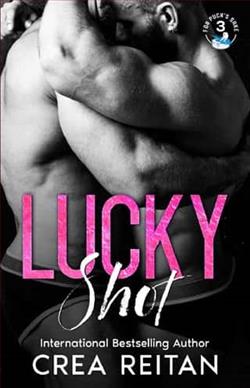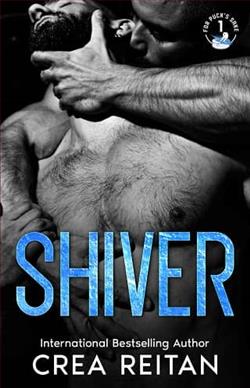Page 15 of BZRK: Reloaded (BZRK 2)
Hair of the dog, as the saying went. A little drink in the a.m. to take the edge off the hangover you’d earned in the p.m.
You’re the wrong person for the job. Become the right person.
“My brother hasn’t got over it,” Keats said. “My brother’s still chained to a cot at The Brick.”
“Kerouac lost three biots,” Wilkes said. “And he was already half nuts.”
“Screw you,” Keats snapped. “My brother was as tough as any man alive.”
“He was,” Nijinsky agreed, and shot a dirty look at Wilkes, who retreated, sulking. “Kerouac was …is …the real thing.” He poured another drink, shorter this time, held it up and said, “To Kerouac, who is a fucking god and still ended up screaming in the dark.” He tossed the drink back.
There was violence in the hearts of those in the room. Nijinsky bitter and furious and insecure. Keats damaged, resentful and wary. Wilkes already a headcase who had now killed and seen killing and watched Ophelia’s legs burn like steak fat on a grill and was itching for a fight.
Plath saw it all. And she heard the unspoken accusations: Why didn’t you kill the Twins?
“Jin,” she said. Just that. And Nijinsky at the sound of his affectionate nickname sucked in a sobbing breath. He looked down at the glass and carefully set it down far from himself.
“I love him,” Nijinsky said.
Plath couldn’t help her automatic glance at Keats.
“Stupid of me, caring about Vincent,” Nijinsky said. “Loving him. And no, I don’t mean like that. I mean, if I’d had a brother . . .” He looked at Keats, who did have a brother, and there were tears in Nijinsky’s eyes. “I mean if I’d had a brother, if I knew what that was like, that would be Vincent. I’d give my useless life for him. And I was too late.”
In a flash Plath saw what she had missed. She wasn’t the only person in the room haunted by What if? and Why didn’t I?
“Maybe we could rescue Ophelia from the FBI . . .” Wilkes started to say. “She could …No one’s a better spinner than Ophelia.” She was pleading for a life and knowing better, knowing that decision would have already been made.
“You’re talking about a deep wire,” Nijinsky said, not meeting anyone’s eye.
“Yeah, deep wire. The deepest. Take some time and get all the way down in Vincent’s brain.” Wilkes sat up. “Ophelia could—”
“Damn it, Wilkes.” Nijinsky was pleading with her. Plath could see that he was on the ragged edge. He couldn’t think about Ophelia. “Ophelia was the best.”
His use of past tense did not escape anyone’s notice.
Wilkes’s face twisted. It was like someone had kicked her in the stomach. She jumped from her seat and walked on stiff legs to the sink. She turned on the faucet and drank straight from the tap. When she straightened up her head banged the cupboard door.
“Son of a bitch!” she screamed. She banged the side of her fist against the cupboard door. And then harder. Then both fists and on and on until it seemed she would beat her hands bloody.
Keats moved smoothly behind her, imprisoned her arms, and waited as she cursed him and struggled madly to get away.
“Was it us?” Wilkes demanded. “Was it us? Was it Caligula? Did Lear order Ophelia killed? Jesus Christ!”
After a while Wilkes said, “Okay, blue eyes, you can let me go.”
He did. She smashed the cupboard one last time and headed for the door. Nijinsky’s arm shot out, he grabbed her wrist and pulled her to him. She struggled for a minute but finally collapsed, sat on his lap, and let him put his arms around her.
He spoke past her spiky hair, his voice quiet, calm. “I don’t know if you’ve seen the news in the last hour,” he said.
Heads shook in the negative.
“The president’s husband is dead. Supposedly he slipped in the bathtub,” Nijinsky said. “I think that’s most likely bullshit.”
“Why would anyone want him dead?” Plath asked.
Wilkes was listening for the answer. For Keats it all meant very little: the American’s first gentleman was not on his radar.
“I doubt anyone wanted MoMo dead,” Nijinsky said. “I think the other side screwed up. I think they’re having a very bad wire.”















